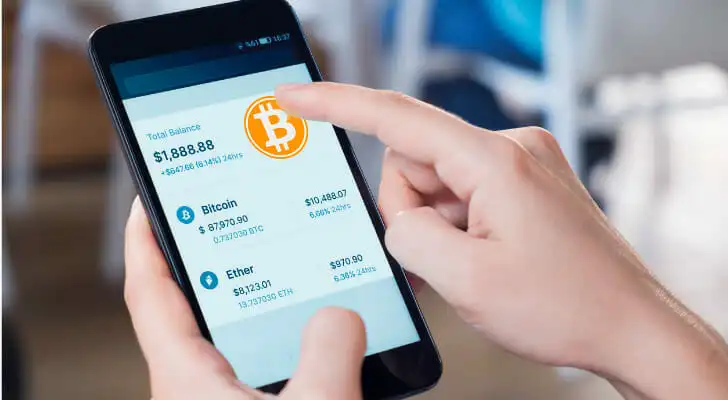Cryptocurrencies like Bitcoin have become household names and continue to grow in popularity. However, to invest in securities in the U.S., you must be at least 18 years old. So if you want to give your children access to crypto, you can buy it for them. Then, when they are of age, you can gift your crypto to them. Here’s what you need to know about buying crypto for children.
However, before diving into cryptocurrency investing, it’s wise to speak with a financial advisor who can help you avoid costly mistakes that other novice investors make.
Cryptocurrency Definition
Cryptocurrency, commonly called “crypto,” is a digital currency that uses blockchain technology to ensure all transactions are secure. This means that it is almost impossible to counterfeit the funds. Typically, crypto is a part of a decentralized peer-to-peer network that is powered by a large computer database. Crypto stands out from other investments since it is not issued by a central authority and has minimal government interference at this time.
You can choose to either mine or buy crypto on an exchange. While very few merchants allow consumers to use crypto to buy items or services, its value continues to make this currency popular among investors.
Gifting Crypto for Kids

All reputable securities exchanges in the U.S. require investors to be at least 18 years or older to invest; crypto is no different. Children are not allowed to buy, sell or trade securities of any kind until they reach the age of maturity. However, buying crypto for your children is an option. You can purchase it and hold onto it until they reach adulthood.
When you buy crypto, there is no bank involved. So, if it’s lost or stolen it’s gone forever, just like if you lost cash. Therefore, one safe solution for buying crypto for your children is to purchase it and then store it in a “cold wallet.” Crypto wallets allow for crypto to be sent to a specific address. It allows you to then send crypto to someone else when you’re ready.
Wallets can be either hot or cold. Hot wallets mean that it’s connected to the internet, while cold wallets function offline (only seldomly connecting to the web). Although cold wallets are less convenient, they are usually more secure since hackers may not have unlimited access. Since fraudsters know they can take your crypto electronically, you will have no recourse if they lift your investment. Thus, using cold storage may make the most sense, especially when you are investing for your children.
With cold storage, you can choose between a paper wallet and a hardware wallet.
- Paper wallet. This type of wallet is essentially paper documents with your private keys, QR code and crypto address. A paper wallet is considered a pretty safe place to store your crypto since hackers will have no access to the information. However, paper wallets are often challenging to establish, and there is no backup if you lose your paper document.
- Hardware wallet. This type of wallet looks like a USB drive. You can then connect it to your computer through the USB port. All of the private keys are saved on the device and created offline. This way, hackers will have difficulty taking your crypto right out from under you.
If you decide to create a paper wallet, you can keep two copies of the documents. You can give one to the child and then keep the other in a secure place in case you lose the first copy. This way, if the first copy becomes misplaced, you can locate the other copy.
If you set up a hardware wallet, you can set up a wallet for your child once they turn 18. Then, you can transfer the crypto either by transferring the crypto to their new wallet to hold on to or cash it out.
Where to Buy Crypto?
Now that you know where to store crypto for your children, it’s important to get familiar with the buying process. So, following these few simple steps will take the confusion out of the process.
Select a Currency Exchange or a Broker
A cryptocurrency exchange connects buyers and sellers. Exchanges such as Coinbase, Gemini and Binance.us provide relatively low-fee, user-friendly trading options. But you will want to understand how it works before you make your first trade.
At the same time, a cryptocurrency broker makes transactions straightforward with easy-to-use interfaces. But be careful because some brokers may charge higher fees than exchanges. Also, some brokers may claim they don’t charge a fee to trade; however, they will sell your trading information to other investors who are buying and selling with larger brokerages. Some of the most well-known crypto brokers are Robinhood and SoFi.
Also, be mindful of brokerages restrictions. For example, Robinhood and SoFi, don’t allow users to transfer any crypto out of the account. This means that if you are using a wallet as described above, you may not be able to work with certain brokerages.
Keep in mind, if you’re a beginner trader, you should choose an exchange or broker that offers fiat current purchases and transfers with U.S. dollars.
Create and Set Up Your Account
After you have considered your options and chosen a cryptocurrency broker or exchange, it’s time to sign up and open an account. You may have to verify your identity based on which platform you choose and amount you want to purchase. Verifying your identity meets federal requirements and helps prevent fraud.
Make sure you have funds in your account in order to purchase crypto. You may be required to link your bank account and make a deposit into your crypto account. Otherwise, you can make the deposit with a debit or credit card or authorize a wire transfer. Depending on which broker, exchange and method of funding, you may have a waiting period of up to a few days before your funds can be used to purchase cryptocurrency.
Take caution, though; while some brokers or exchanges permit deposits from your credit card, it can be expensive with a very high risk. This is because cryptocurrency purchases on your credit card are considered cash advances by your card company. Cash advances normally carry higher fees than a normal purchase, and you’re subject to further cash advance fees.
This doesn’t include any fees that your crypto exchange or brokerage charges you. Those fees themselves can be up to 5%, indicating you may possibly lose up to 10% of your crypto purchase to fees alone.
Place Your Crypto Order
Once your account is ready to go, you can buy crypto. There are many different types of cryptocurrencies to invest in. You have everything ranging from household names like Bitcoin and Ethereum to more ambiguous cryptos like Holo. It’s also possible to buy fractional shares, so you can purchase costly tokens that may cost you thousands of dollars on your own.
Here are the biggest cryptocurrencies:
- Bitcoin (BTC)
- Ethereum (ETH)
- Tether (USDT)
- Binance Coin (BNB)
- Cardana (ADA)
- Dogecoin (DOGE)
- XRP (XRP)
- USD Coin (USDC)
- Polkadot (DOT)
- Uniswap (UNI)
After you purchase your shares, you can transfer them to your cold wallet. Again, if you use a broker, make sure they don’t restrict the transfer of currency.
Is Gifting Crypto Taxable?

Giving cryptocurrency as a gift doesn’t need to be reported on your personal tax return. You may be required to file an IRS Form 709 gift tax return, depending on how much value the cryptocurrency holds. It isn’t mandatory to report the transaction on your tax return if the cryptocurrency gift is $15,000 or less. Now, if you give one single recipient more than $15,000 in cryptocurrency during the tax year, it is obligatory to file a gift tax return. But as previously stated, you will most likely not have this tax obligation. However, to use the estate tax exemption (making the gift tax-free) and lifetime gift, you have to file a gift tax return.
While you aren’t always required to report cryptocurrency you gift, be aware, if you sell or exchange cryptocurrency, all transactions must be reported on your personal tax return. If you have questions about crypto taxes, speak with a tax professional.
Key Considerations When Buying Crypto for Kids
Although crypto values like Bitcoin and Ethereum have been extremely volatile, on average investors have seen returns if they held onto the investment for over three years. So, if your child has a time horizon longer than three years, you may be able to yield some growth from your child.
Crypto’s increasing popularity and growing opportunities bring the possibility of crypto investing a more significant economic role in the future. We have no way of predicting the future, but these cryptocurrencies like Ethereum and Bitcoin have continued to grow despite challenges. They have resisted against hackers, regulations and even negative feedback from the media.
Lastly, educating yourself about your options is just as important as exposure with personal finance. While you need to learn all you can, you won’t learn as much until you take that first small step into crypto. You can learn more about crypto’s history, growth, performance, challenges, technology and more. Do your research, talk to a financial advisor and see the best way for you to start.
The Bottom Line
Cryptocurrency has become increasingly popular over the last couple of years. Digital currency may have piqued your curiosity a time or two, maybe even causing you to wonder if it’s a good investment for your children. While you have to be 18 years old to purchase cryptocurrency, you can give your child crypto for the future. There are different ways to purchase crypto, some safer than others. A financial advisor can help you decide if crypto makes sense for you and your child’s future.
Tips for Investing
- Whether you’re buying a low-risk index fund or investing in high-risk alternative securities like crypto, the best investments depend on sound advice. That’s where financial advisors can make a big difference. Finding a qualified financial advisor doesn’t have to be hard. SmartAsset’s free tool matches you with up to three financial advisors who serve your area, and you can interview your advisor matches at no cost to decide which one is right for you. If you’re ready to find an advisor who can help you achieve your financial goals, get started now.
- Cryptocurrency is only one type of alternative asset that can be invested in. Other alternative investments include things like real estate, precious metals, rare musical instruments and fine art.
Photo credit: ©iStock.com/kate_sept2004, ©iStock.com/ersinkisacik, ©iStock.com/Eoneren
